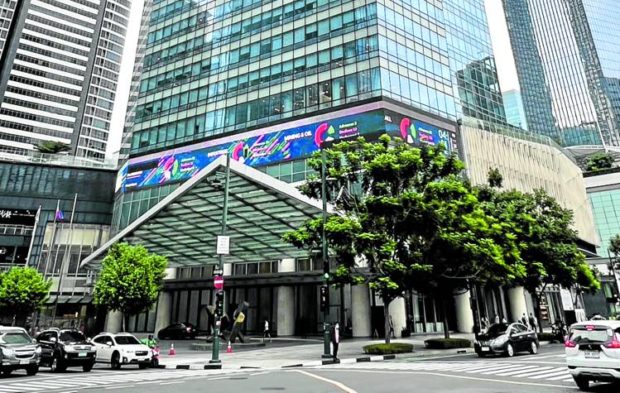
Philippine Stock Exchange Tower in Bonifacio Global City —DAXIM L. LUCAS
Inflation risks, worsened by the Philippine peso’s slide against the U.S. dollar, pushed the Philippine Stock Exchange Index (PSEi) into bear market territory in late September.
A bear market describes a condition when stock prices decline by 20 percent or more from the recent peak.
The PSEi sank to as low as 5,699 during this period before gradually recovering to the present level.
Poor market sentiments also forced large companies planning to hold their initial public offerings (IPOs) to delay their listing plans.
These include the P28-billion IPO of billionaire Enrique Razon Jr.’s Prime Infrastructure Capital Inc. and those of North Star Meat Merchants Inc. (P4.5 billion) and Upson International (P5.4 billion).
Despite the volatile environment, nine companies were brave enough to hold their IPOs in 2022. These were Haus Talk Inc., Figaro Coffee Group Inc., Citicor Energy REIT Corp. , Bank of Commerce, CTS Global Equity Group Inc., Rslag Corp., VistaREIT Inc., Balai ni Fruitas Inc. and Premiere Island Power REIT Corp.
Asset prices were battered for most of 2022 as central banks, including the influential US Federal Reserve and the Bangko Sentral ng Pilipinas, turned to aggressive interest rate hikes to hel shield consumers from surging inflation.
Those events were further amplified by the energy crisis in the wake of Russia’s invasion of Ukraine that started in February.
Outlook for 2023
After this bruising year that spared very few investors, stock market participants can expect more volatility in 2023.
The outlook for the coming year remains fraught with risks amid global recession worries.
A recent report by Singapore’s DBS Group Research said the Philippines might be among the regional losers especially in the latter part of 2023.
The financial group assigned the Philippines a “negative” outlook with a PSEi year-end target of 6,700, which offers minimal upside from its current level.
“In the next 12 months, we see a story of two halves to bring trading opportunities to the table. For the first half of next year, we prefer to be tactically invested in view of a Fed pause that could result in bear market rallies and presenting opportunities to sell as the market comes close, if not overshoot, to the upper end of our target range,” DBS said.
The environment, however, could shift rapidly in the second semester.
“Come the second half, we prefer underweight Philippine equities as we expect prices to reflect the lagged impact of policy tightening to the economy and earnings. We are of the view that a Fed/BSP pause is a signal to the end of the late cycle and the beginning of a downturn (i.e. slowdown/ recession),” DBS noted.
DBS said gains would be capped by outflows of passive funds during bear market rallies. It also warned of “overly optimistic” earnings forecasts.
“Our concern is that consensus earnings projections appear too high and need a reality check. We are of the view that the street is underestimating the impact of the pace and magnitude of policy tightening on earnings in the next 12 months,” DBS said.
“This is given that the latter half of 2023 will tell a different narrative as we see factors that could challenge earnings momentum,” it added.
These factors include cooling demand and shrinking profit margins, which would restrict capital spending meant to bankroll future growth.
The previous week, the BSP raised the key interest rate for the seventh time this year while hiking its inflation forecast for 2023.
Inflation surged to 8 percent in November. It would remain elevated through next year as the BSP increased the full-year forecast to 4.5 percent to 4.3 percent—still above its target range of 2 to 4 percent.
BSP Governor Felipe Medalla earlier said in an interview with Bloomberg TV they might continue to raise interest rates in the next few months after their 50-basis-point hike last week.
DBS’s outlook offered a sobering view after the Philippine investment arm of Canadian financial services giant Sun Life forecasted rosier prospects for the stock market next year.
Rosier forecast
Sun Life Investment Management and Trust Corp. sees the PSEi rising to 7,850, implying a roughly 20 percent upside from the current level.
Company president Mike Enriquez said this was based on lower inflation and expectations of sustained household spending, which would bode well for corporate earnings.
“We’ve been seeing consumers continue to spend despite high prices. As inflation [comes] down, we can expect this consumption trend to continue,” he said during a recent media briefing.
“We don’t want inflation to get out of hand because, as the BSP mentioned, it will have long-term effects on the economy,” he explained.
For 2023, Enriquez favored banking and consumer stocks while telling investors to avoid property companies, especially developers that were less diversified in their revenue sources.
He explained that bank margins would likely grow on higher interest rates and loans while consumer company margins would also improve.
“[W]e’ve seen commodity prices start to go down so input costs would be much lower for the consumer sector. Because this year, they were hit hard by higher input costs,” Enriquez said.
For its part, DBS said investors needed to be more selective when investing during challenging market conditions.
Its top defensive plays were Century Pacific Food Inc., Robinsons Retail Holdings Inc. and Universal Robina Corp. while top beneficiaries or a central bank pivot were Citicore Energy REIT Corp., MREIT Inc., and RL Commercial REIT Inc.
Its top undervalued picks were Metropolitan Bank & Trust Co., Robinsons Land Corp., and Security Bank Corp.
“We prefer undervalued index names whose current valuations leave sufficient downside protection from multiple de-rating and potential outflows,” DBS explained.
https://business.inquirer.net/364802/bloodbath-at-pse-peso-falls-to-new-low